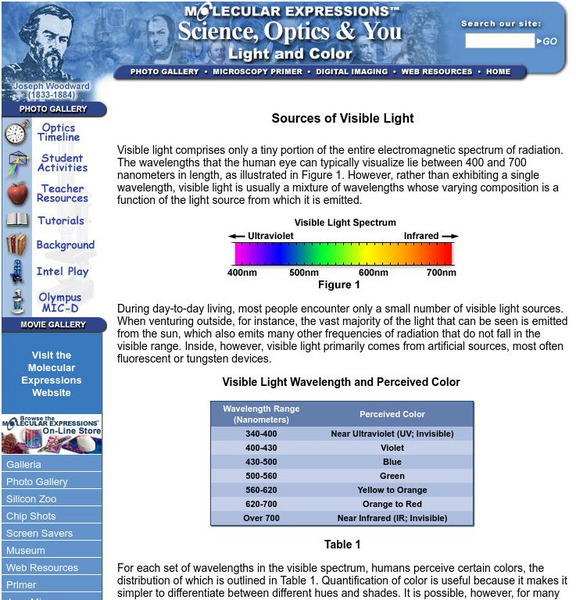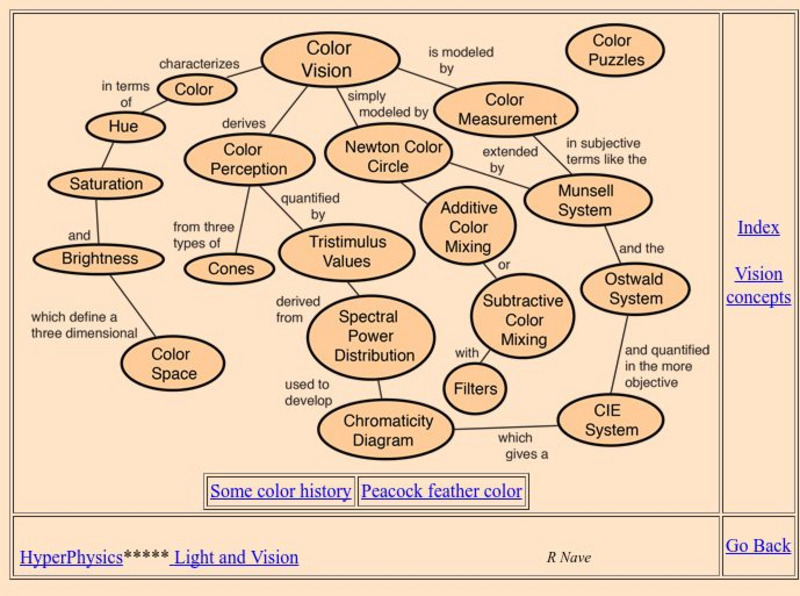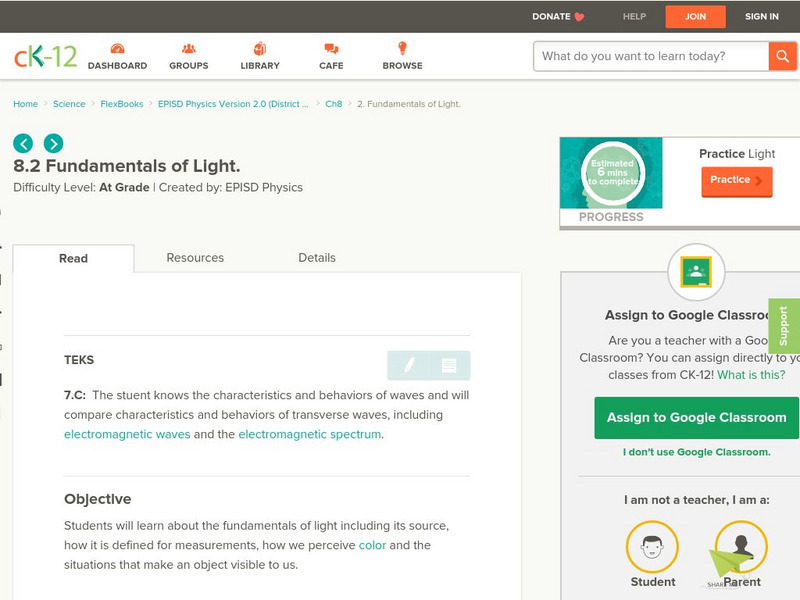Curated OER
INFRARED OLD FAITHFUL
Middle schoolers view video clips and still images of Old Faithful and review the main questions and curiosities regarding Old Faithful. They break into groups and take on the roles of explorers and have come upon this interesting...
Curated OER
Jupiter's Moons
Students predict which of Jupiter's moons will be the "brightest" in infrared wavelengths. Using provided information, they rank the moos from brightes to faintest in infrared.
Curated OER
Spectral Surprise
Learners experience a model that produces, separating, and displaying spectral colors.
Curated OER
Hertzsprung-Russell Diagram
Students examine the relationship between temperature and brightness. In this astronomy lesson students will correlate the evolution of stars to the HR diagram plotted.
Curated OER
Water Testing
In this water testing pre-lab worksheet, students describe positive ions, precipitate, and the Tyndall effect. This worksheet has 14 short answer questions.
Florida State University
Florida State University: Light and Color: Sources of Visible Light
This site discusses primary lighting sources and gives information on the different properties and spectral characteristics of each. Also includes links to some interactive Java applets.
Science Buddies
Science Buddies: Technicolor Shadows: Lessons in Light and Color
Is that right side of your brain yearning to express its artistic side? This is a project that blends art with science. Learn about light and colorful shadows in these experiments where you mix and match various colors of light to create...
South Carolina Educational Television
Know It All Media: Light and Color
Why do we see certain colors? This interactive animation demonstrates the concept of the visible spectrum, and how we see the different colors of the rainbow.
NASA
Nasa: Tour of the Electromagnetic Spectrum: Visible Light
Visible light waves are the only electromagnetic waves we can see. We see these waves as the colors of the rainbow. Each color has a different wavelength. Red has the longest wavelength and violet has the shortest wavelength. When all...
Physics Classroom
The Physics Classroom: Light Waves/color: Absorption, Reflection, Transmission
In this physics classroom, students learn how and why light of certain frequencies can be selectively absorbed, reflected or transmitted.
Physics Classroom
The Physics Classroom: Light Waves/color: Visible Light and the Eye's Response
Students learn how the eye responds to visible light, and how that function ultimately allows us to see.
CK-12 Foundation
Ck 12: Physical Science: Color
[Free Registration/Login may be required to access all resource tools.] Overview of the different colors in visible light and how they relate to its wavelength, how a prism separates visible light into its different colors, the colors of...
Florida State University
Florida State University: Molecular Expressions Microscopy Primer: Light and Color Refraction of Light
Comprehensive and sophisticated overview of light refraction includes an historical overview of the subject and explanations of the mathematics that underpin refractive indexes, the relative index of refraction, Snell's law, and light...
Institute for Dynamic Educational Advancement
Web Exhibits: Causes of Color
Why are things colored? This site explores the 15 phenomena that create our colorful world. Learn how light is made, lost, and moved!
Physics Classroom
The Physics Classroom: Color Addition
This tutorial on the addition of color to light discusses the primary, complimentary, and secondary colors of light.
Science Struck
Science Struck: Visible Color Spectrum Wheel
A brief explanation of the visible color wheel.
Project Britain
Primary Homework Help: Color Investigation Puzzle
Try making words on the screen disappear by changing the background color of this page. Add or subtract red, green, or blue, and see how light is made up of many different colors.
Physics Classroom
The Physics Classroom: Light Waves/color: Electromagnetic and Visible Spectra
This illustrated physics tutorial explains the electromagnetic and visible spectra of light using illustrated examples and interactive practice problems.
Georgia State University
Georgia State University: Hyper Physics: Color
This site from Georgia State University discusses the location of visible light on the electromagnetic spectrum. Includes the wavelength values for various colors of light within the visible light spectrum.
Georgia State University
Georgia State University: Hyper Physics: Color Vision Concepts
An indexing page from Georgia State University for a variety of other pages associated with color vision. Pages are filled with meaningful graphics and thorough explanations.
Physics Classroom
The Physics Classroom: The Electromagnetic and Visible Spectra
A tutorial on the electromagnetic and visible spectra. Discusses dispersion and how perceptions of white and black are related to the visible light spectrum.
Physics Classroom
The Physics Classroom: Light Waves and Color: Color Addition
Through illustrated example problems, and some interactive practice, students learn about color addition and color perception.
Science Struck
Science Struck: Wavelength of Visible Light Spectrum
Explains where visible light fits into the electromagnetic spectrum and the wavelengths for the different colors we see.
CK-12 Foundation
Ck 12: Fundamentals of Light
[Free Registration/Login may be required to access all resource tools.] Students investigate the fundamentals of light including its source, how it is defined for measurements, how we perceive color, and the situations that make an...
















